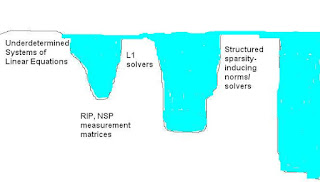When I referred to islands of knowledge recently, I meant that research is populated with a series of communities that are themselves self sufficient. As time goes, some work provide a connection between these communities, a little bit as if water is receding and some new landscape emerges thereby showing the connection between some of these island communities.
.
For instance, in compressive sensing, back in the early 1970's, the L1 solvers were recognized to be sparsity promoting....
but it took the work of Tao, Candes, Romberg and Donoho to see the relationship between these solvers and provide admissible conditions for measurement matrices. Think of the mathematician as changing the landscape by draining the waters while the engineer sail from one island to the other. The mathematician gets a hint that there ought to be a connection between these islands as the engineer gets things working artificially connecting these communities by sea. The engineer becomes trusted by all when all see the deeper connections becoming obvious as the water receeds.
If you are a mathematician changing the landscape of knowledge: What island is next ?
If, like a pirate, you are sailing from one island to the next: What are you waiting for ?
PS: The concept of self sustaining communities as islands is not far from the concept of James Glieck in his new book reviewed in the New Yorker Review of Books:
reviewed in the New Yorker Review of Books:
It is our task as humans to bring meaning back into this wasteland. As finite creatures who think and feel, we can create islands of meaning in the sea of information.
Side view of the drawings shown above.






2 comments:
dear igor,
very pertinent observation! thanks for this big-picture perspective.
very nice illustration of the island concept.
Post a Comment